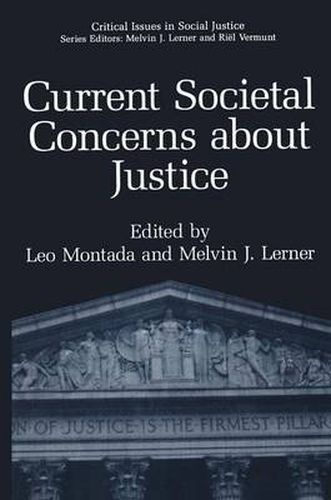Readings Newsletter
Become a Readings Member to make your shopping experience even easier.
Sign in or sign up for free!
You’re not far away from qualifying for FREE standard shipping within Australia
You’ve qualified for FREE standard shipping within Australia
The cart is loading…






This title is printed to order. This book may have been self-published. If so, we cannot guarantee the quality of the content. In the main most books will have gone through the editing process however some may not. We therefore suggest that you be aware of this before ordering this book. If in doubt check either the author or publisher’s details as we are unable to accept any returns unless they are faulty. Please contact us if you have any questions.
What role does justice play in the formation of public opinion and the scholarly debates about social problems? Does the perception of injustice force problems to appear on the political agenda? Does the perception of an injustice give momentum to social change? Or are violations of self-interest or threats to one’s material welfare the more important factors? Or are empathy-driven concerns for the needy and the disadvan taged motivations to solve societal problems? What is known about the role justice concerns play in leadership? In several chapters of this volume, justice concerns and justice motives are viewed in relation to other concerns and motivations; welfare, self-interest, altruism. It is argued that the consensus of political theorists converges on mutual advantage as the main criterion of acceptable solutions to solving socie tal problems. In economics, self-interest is considered the driving force and provides the criterion of acceptable solutions. Sociological and social psychological exchange theories share these basic assumptions. Thus, questions are raised and answered concerning how justice and these other important motives appear in the analyses of societal prob lems and the search for solutions. Moreover, in addition to the issue of conflicting motives-self interest, altruism, justice-it is commonly recognized that the definition of what is just and what is unjust is open to question. In public as well as in scientific dialogues, diverging views about justice have to be integrated or decided upon.
$9.00 standard shipping within Australia
FREE standard shipping within Australia for orders over $100.00
Express & International shipping calculated at checkout
This title is printed to order. This book may have been self-published. If so, we cannot guarantee the quality of the content. In the main most books will have gone through the editing process however some may not. We therefore suggest that you be aware of this before ordering this book. If in doubt check either the author or publisher’s details as we are unable to accept any returns unless they are faulty. Please contact us if you have any questions.
What role does justice play in the formation of public opinion and the scholarly debates about social problems? Does the perception of injustice force problems to appear on the political agenda? Does the perception of an injustice give momentum to social change? Or are violations of self-interest or threats to one’s material welfare the more important factors? Or are empathy-driven concerns for the needy and the disadvan taged motivations to solve societal problems? What is known about the role justice concerns play in leadership? In several chapters of this volume, justice concerns and justice motives are viewed in relation to other concerns and motivations; welfare, self-interest, altruism. It is argued that the consensus of political theorists converges on mutual advantage as the main criterion of acceptable solutions to solving socie tal problems. In economics, self-interest is considered the driving force and provides the criterion of acceptable solutions. Sociological and social psychological exchange theories share these basic assumptions. Thus, questions are raised and answered concerning how justice and these other important motives appear in the analyses of societal prob lems and the search for solutions. Moreover, in addition to the issue of conflicting motives-self interest, altruism, justice-it is commonly recognized that the definition of what is just and what is unjust is open to question. In public as well as in scientific dialogues, diverging views about justice have to be integrated or decided upon.